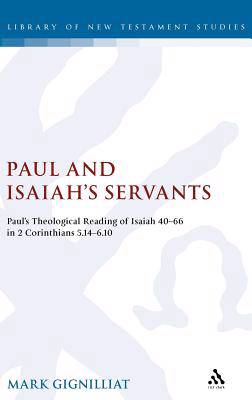
- Afhalen na 1 uur in een winkel met voorraad
- Gratis thuislevering in België vanaf € 30
- Ruim aanbod met 7 miljoen producten
- Afhalen na 1 uur in een winkel met voorraad
- Gratis thuislevering in België vanaf € 30
- Ruim aanbod met 7 miljoen producten
Zoeken
Paul and Isaiah's Servants
Paul's Theological Reading of Isaiah 40-66 in 2 Corinthians 5:14-6:10
Mark S Gignilliat
€ 195,95
+ 391 punten
Omschrijving
Paul's reading of the Old Testament continues to witness to the significance of reading the Old Testament in a Christian way. This study argues that a theological approach to understanding Paul's appeal to and reading of the Old Testament, especially Isaiah, offers important insights into the ways in which Christians should read the Old Testament and a two-testament canon today. By way of example, this study explores the ways in which Isaiah 40-66's canonical form presents the gospel in miniature with its movement from Israel to Servant to servants. It is subsequently argued that Paul follows this literary movement in his own theological reflection in 2 Corinthians 5:14-6:10. Jesus takes on the unique role and identity of the Servant of Isaiah 40-55, and Paul takes on the role of the servants of the Servant in Isaiah 53-66. From this exegetical exploration conclusions are drawn in the final chapter that seek to apply a term from the history of interpretation to Paul's reading, that is, the plain sense of Scripture. What does an appeal to plain sense broker? And does Paul's reading of the Old Testament look anything like a plain sense reading? Gignilliat concludes that Paul is reading the Old Testament in such a way that the literal sense and its figural potential and capacity are not divorced but are actually organically linked in what can be termed a plain sense reading.
Specificaties
Betrokkenen
- Auteur(s):
- Uitgeverij:
Inhoud
- Aantal bladzijden:
- 212
- Taal:
- Engels
- Reeks:
- Reeksnummer:
- nr. 330
Eigenschappen
- Productcode (EAN):
- 9780567044839
- Verschijningsdatum:
- 10/07/2007
- Uitvoering:
- Hardcover
- Formaat:
- Ongenaaid / garenloos gebonden
- Afmetingen:
- 162 mm x 242 mm
- Gewicht:
- 480 g

Alleen bij Standaard Boekhandel
+ 391 punten op je klantenkaart van Standaard Boekhandel
Beoordelingen
We publiceren alleen reviews die voldoen aan de voorwaarden voor reviews. Bekijk onze voorwaarden voor reviews.











